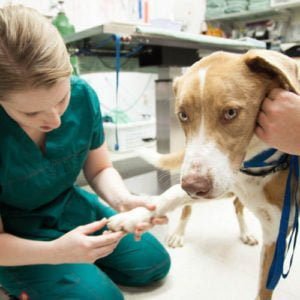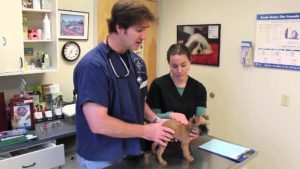One of the first steps in making your new puppy a member of your family is to take it to the vet for a routine check-up, exam and get their first shots. During the first few months of your puppies, life is when they need the most care and will benefit the most from these first shots, and preventative care. Here is what you can expect on your first vet visit for puppy!
What Kind of Shots Will Be Given?
Many times, owners walk into their vet’s clinic and see a large sheet of vaccines that the puppy needs and become defensive. While these may be costly in the beginning, it is better to get them done, than have your pup become sick with something that could have easily been prevented.
Expect At Puppy’s First Vet VisitDuring your first visit, expect these shots
◊ Rabies
◊ Canine Distemper
◊ Canine Parvovirus
◊ Canine Hepatitis
Depending on where you go, they may have different recommendations, however, for 6-8 week old puppies, these are the main four shots that will be given at their first visit.
Read full: PetSafe Drinkwell 2-Gallon Pet Fountain Review
What Kind Of Preventive Care Will Be Discussed?
While a puppy is still young, a vet will check for heart worms. Heartworms are nasty parasites that are transmitted by mosquitos. Once infected, they travel to the heart and breed there and can cause irreparable damage if not caught in time. Veterinarians will always recommend starting a heartworm prevention schedule earlier, rather than wait until they are infected, and have to undergo costly treatment. Heartworm prevention has evolved in the past years, now, options include chewable, powders, and even a 6-month injection.
Your vet may also discuss during your first visit with them, a flea and tick prevention plan, although they may suggest waiting until they are slightly older, or have more weight before starting. They may suggest a topical clove based solution which is good for younger animals.
What About Spaying and Neutering?
One of the most important parts of responsible pet ownership is getting your pet spayed or neutered at a young age, and your vet may speak to you about this during your first visit. There are hundreds of benefits and very few drawbacks to getting your animal altered. By altering them, you significantly reduce the changes of certain types of cancer in their old age, you also may curb any aggression that may be displayed when females are in heat and seeking a mate. You also reduce the likelihood that your animal will run away in search of a mate. Overall, there for more benefits to altering your animal, than keeping them intact.
Should I Think About Microchipping?
In this day and age, technology has made it much easier to find our pets in the event they get loose. Microchipping is just one way to ensure that if your pet is found by animal control or someone brings them into a shelter; you can be contacted immediately and retrieve your pet. It is important to keep the information updated and current. It is also a good idea (and required by law) to have a tag on their collar or harness with your information. For their safety, it is better not to list the animal’s information. Just your phone number and address, and if they have been microchipped. While an additional cost, your vet can do it at your first visit.
Read more: Top 5 Best Puppy Training Pad Holder Reviews
What Does the First Vet Visit Cost?
Depending on where you live, the costs will vary. Talk to your friends and other dog owners to find a veterinarian that they trust, and call around. Finding the best services with best cost of puppy vet visit for your pup is important, but it is entirely understandable for the need to shop with a budget in mind too. Local shelters, the Humane Society, and even small non-profit groups may be able to give you a discount based on your financial situation.
On average, the four core shots, and their boosters will cost about $15-20 per round, totaling to about $60-120 for the entire series. Microchipping costs between $25-50. Heartworm and flea and tick prices will vary from office to office, and may be able to be found for cheaper online, or at your local pet store.
What Items Do I Need for the Vet?
Before your first visit, you will want to bring any information you have about its pedigree, any previous visits, as well as a list of health problems the parents had like a puppy vet checklist . Your vet will understand your breed, and give you tips on how to prevent problems later in life. Large dogs tend to have hip problems, where smaller animals may have problems with stiff joints and temper. Each animal is different. Items to include on your first vet visit for puppy checklist:
- Information on pedigree
- Previous vet visits
- Type of food being fed
- How often puppy is being fed
- Treats
- A favorite toy
Going to the vet may seem scary for both you and your dog the first time, but, if you make it a positive experience, you and your new puppy will enjoy vet visits much more in the future. Bring treats and toy and make it a big deal, give them lots of love and attention and be positive throughout the visit. They are looking for you to model their behavior!








